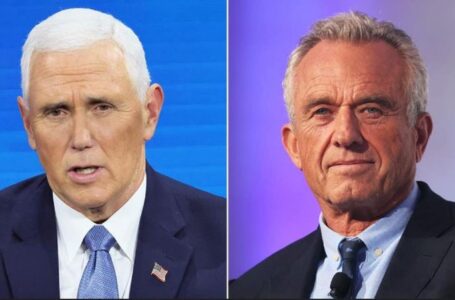Zelensky says Ukraine war will end ‘faster’ under Trump presidency
Oregon Supreme Court allows Trump to appear on primary ballot


Oregon’s top court on Friday allowed Donald Trump to run in the state’s presidential primary, saying it wouldn’t take up the issue of whether he’s qualified to get on the state’s ballot while the Supreme Court considers a challenge on the issue from Colorado.
Last month, the Colorado Supreme Court and Maine’s secretary of state separately concluded that the former president had engaged in insurrection before and during the Jan. 6, 2021, attack on the U.S. Capitol. That finding prevents Trump from running again because a provision of the Constitution’s 14th Amendment that says those who engaged in insurrection cannot hold office, the separate rulings found.
Trump appealed the Colorado decision, and the Supreme Court has agreed to weigh in on the matter, with arguments set for Feb. 8. Trump has separately appealed the Maine decision in state court. Colorado and Maine are allowing Trump’s name to appear on their primary ballots while the Supreme Court considers the issue.
In a brief order, Oregon Supreme Court Chief Justice Meagan Flynn said her court was not accepting the case now and would wait to see what the U.S. Supreme Court does. “A decision by the United States Supreme Court regarding the Fourteenth Amendment issue may resolve one or more contentions that [the plaintiffs] make in this proceeding,” she wrote in explaining the decision not to take the case.
The Supreme Court decision will likely resolve for all states whether Trump can run in 2024. Without a Supreme Court ruling, some states could keep Trump’s name off the ballot while others allow him to run.
All sides hope for a quick ruling from the Supreme Court. Iowa holds the first nominating contest on Monday, and other states soon follow. Colorado and Maine hold primaries March 5, which is also known as Super Tuesday. Oregon’s primary is May 21.
Section 3 of the 14th Amendment of the Constitution bars from office those who engaged in insurrection after swearing an oath to uphold the Constitution. The amendment was ratified three years after the end of the Civil War, and the section on insurrectionists was meant to keep former Confederates out of office.
Trump’s opponents have used the measure to argue that the former president cannot appear on ballots around the country because of what he did and said before and during the attack on the U.S. Capitol as Congress met to certify Joe Biden’s victory.
Voters in Oregon filed their challenge to Trump’s candidacy with the state’s top court in November with the help of the liberal group Free Speech for People. That group also assisted with challenges in Michigan, Minnesota, Illinois and Massachusetts. The top courts in Michigan and Minnesota recently ruled that Trump could appear on the ballot in those states. The Illinois and Massachusetts challenges are pending.
“The Oregon Supreme Court’s decision not to decide is disappointing,” said a statement issued by Free Speech for People spokesman Edward Erikson. “Waiting until the U.S. Supreme Court issues its order only compresses the time that the Oregon Supreme Court may have to resolve the issues that may remain if the U.S. Supreme Court does not fully resolve all the issues in this case.”
Trump campaign spokesman Steven Cheung said in a written statement that the Oregon Supreme Court made the right decision. He called the legal challenges to Trump’s candidacy a form of “election interference” and said they should be dismissed.











